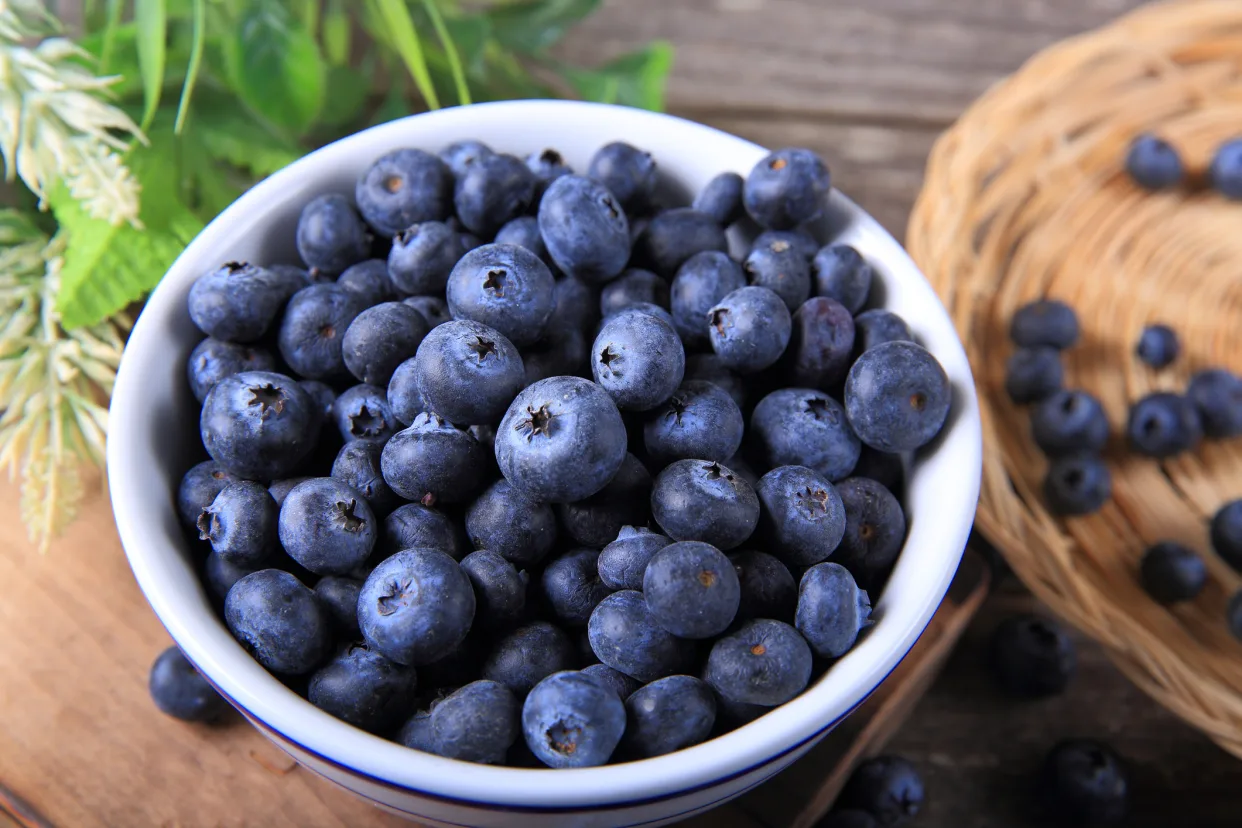Scientists have shed light on what gives blueberries their distinctive colour, despite the fruity berries actually having a dark red pigment in the skin.
Fresh from learning why urine is yellow, researchers have uncovered what makes blueberries, well, blue.
Turns out their unique hue is down to tiny structures in the wax coating of the berries.
The University of Bristol research team say this applies to lots of fruits that are the same colour, including damsons, sloes and juniper berries.
Commenting on the findings Rox Middleton, research fellow at Bristol’s School of Biological Sciences, said: “The blue of blueberries can’t be ‘extracted’ by squishing – because it isn’t located in the pigmented juice that can be squeezed from the fruit.
“That was why we knew that there must be something strange about the colour.
“So we removed the wax and re-crystallised it on card and in doing so we were able to create a brand new blue-UV coating.”
Despite the dark red colour of the pigments in blueberry skin, their blue colour is provided by a layer of wax that surrounds the fruit which is made up of miniature structures that scatter blue and UV light.
Researchers say this makes the fruit appear blue to humans and to certain birds.
Blueberries have many benefits for the gut. (Getty Images)
The colour is a result of the interaction of the randomly arranged crystal structures of the waxy coating with light, the study suggests.
Dr Middleton adds: “It was really interesting to find that there was an unknown colouration mechanism right under our noses, on popular fruits that we grow and eat all the time.”
Study authors explain that most plants are coated in a thin layer of wax which has multiple functions.
Many of these functions are not known, but it can be very effective as a self-cleaning coating, and in keeping water away.
Until the new study, published in Science Advances, researchers did not know how important the structure was for visible colouration.
Now the researchers plan to look at ways of recreating the coating and applying it, which could lead to a more sustainable, biocompatible and even edible UV and blue-reflective paint.
Gut health benefits of blueberries
From sprinkling them on our porridge to whizzing them up in a smoothie, blueberries are a delicious yet nutritious way of ticking off one of your five a day.
Regularly touted as one of the original ‘superfoods’, the little blue-hued berries have been known to boost heart health, improve memory, and offer many other health perks, but they are also pretty beneficial for the gut.
Packed with nutrients, such as fibre and vitamin C, blueberries also contain special antioxidants that may help to off disease, but studies suggest the polyphenol and fibre content of blueberries may help relieve gut symptoms and improve general wellbeing in those with abdominal symptoms from gut disorders.
And there are some other impressive gut health benefits too.
“Blueberries can be a great option to reach for to support your gut health and microbiome as they are high in fibre and contain antioxidants such as Vitamin A, vitamin C and anthocyanins,” explains Gabby Morse, specialist dietician at Nuffield Health St Bartholomew’s Hospital.
“They are also rich in prebiotics including polyphenols which can help contribute to a healthy gut,” Morse adds.
Blueberries are high in fibre which has benefits for gut health. (Getty Images)
Research suggests that blueberries may significantly alter gut microbial composition. They may also help support the function of short-chain fatty acid (SCFA)-producing bacteria.
In one study assessing the potential impact of eight types of berries on the gut microbiome, blueberries were shown to have the highest abundance of types of anthocyanins. Blueberries were also shown to help increase the populations of SCFA-producing bacteria, which could help to prevent inflammation.
“When it comes to improving your gut health, the best advice is always to eat a diverse range of plant-based foods, aiming for 30 per week,” Morse continues.
She suggests exploring frozen as well as fresh options of the blue berries and adding to porridge, a salad, or with yoghurt as a sweet treat.
“Remember, no one food alone will improve your gut health, but it’s about the positive contribution this might make to your overall diet,” she adds.
Additional reporting PA.













Got a Questions?
Find us on Socials or Contact us and we’ll get back to you as soon as possible.